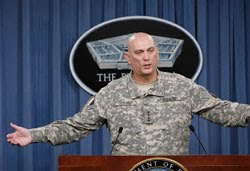 If you were flipping through the pages of your local newspaper this morning, and stumbled upon the "This Day in History" section, you might have come across this entry:
If you were flipping through the pages of your local newspaper this morning, and stumbled upon the "This Day in History" section, you might have come across this entry:July 26, 1948: U.S. President Harry Truman issues Executive Order 9981, effectively desegregating the U.S. military.
As Presidential executive orders go, this is probably one of the biggest in history. Civil rights activist Dorothy Height (who sadly passed away earlier this year) deemed Truman's order "the most significant institutional advance for the civil rights of black Americans since President Lincoln issued the Emancipation Proclamation." And the order was one of the finest examples of a President bucking popular opinion, in order to do what was fundamentally right.
As Joe Sudbay at AMERICAblog notes, Truman's push to desegregate the military ran counter to popular opinion, with almost two-thirds of the country saying back in 1948 that the military was just fine as a segregated institution. Heck, even the U.S. military, when surveyed about their views on race, were hesitant to desegregating the military (as Igor Volsky at Think Progress pointed out last week). Still, Truman knew that it was the right thing to do. And sometimes, the right thing to do shouldn't have to wait until popular opinion catches up with it.
The parallels between Truman's push to desegregate the U.S. military, and the push today to repeal "Don't Ask, Don't Tell" and open the U.S. military up to gay, lesbian and bisexual servicemembers are pretty striking. Indeed, it was Harry Truman's grandson, Clifton Truman Daniel, who recently noted the similarities, saying that proponents of keeping the military segregated used similar arguments to proponents of "Don't Ask, Don't Tell."
Clifton Truman Daniel wrote a letter to President Obama, on behalf of the Servicemembers Legal Defense Network (SLDN), challenging "Don't Ask, Don't Tell" earlier this year. At the time he wrote that while he's uncertain how his grandfather, President Truman, would have reacted to "Don't Ask, Don't Tell," he was hopeful that his grandfather would have recognized the basic issues of fairness and equality in the debate.
"While I have no idea where my grandfather would stand on “Don’t Ask, Don’t Tell,” I do know that he admired service and sacrifice. An estimated 66,000 gay and lesbian Marines, Soldiers, Sailors, Airmen and Coastguardsmen are willingly risking their lives to defend our nation, despite being treated as second class citizens," Clifton Daniel Truman wrote. "I would hope that my grandfather would want his openly gay great-granddaughter and others like her to have the opportunity to serve the country they love with dignity and integrity."
We're hopefully heading in the right direction toward a repeal of "Don't Ask, Don't Tell." Indeed, nearly 80 percent of the country want to see the policy thrown out the door. The U.S. Senate is likely going to vote on their "Don't Ask, Don't Tell" compromise legislation in September, as part of the defense spending bill, which should set in motion (outrageous Pentagon surveys notwithstanding) the process for moving repeal forward.
But there is something to be said about Truman's bold act of courage in issuing Executive Order 9981. If only other Presidents had the same tenacity to break down institutional discrimination wherever it may exist.
Photo credit: Wikimedia Commons
Source By: Michael Jones is a Change.org Editor



